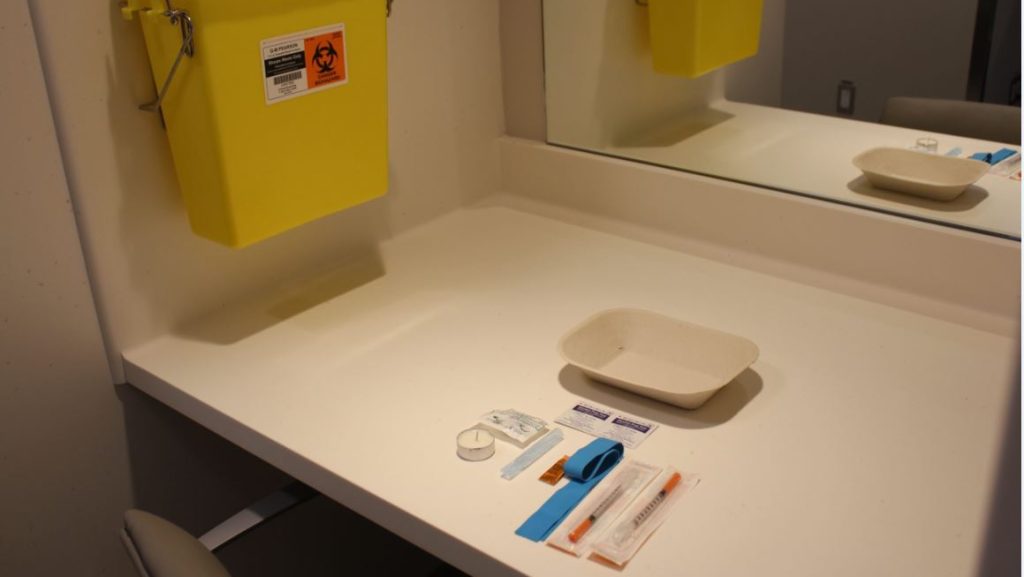Alberta and Calgary officials trade blows over safety and supervised consumption sites

Posted May 12, 2022 6:39 pm.
Last Updated May 12, 2022 7:51 pm.
Online jabs were traded between Alberta’s associate minister of mental health and addictions and a Calgary city councilor when it comes to transit safety and supervised consumption sites.
In a tweet on May 10, Ward 11 councilor Kourtney Penner called for more public transit safety and ensuring public safety at LRT stations. She also criticized the government’s approach to addiction, saying, “the province is making it harder for those seeking supervised consumption to get care.”
Associate Minister of Mental Health and Addictions, Mike Ellis fired back and suggested if Calgary wanted to transform LRT stations into supervised consumption sites, they could fill out an application.
If the City of Calgary wants to turn LRT stations into supervised consumption sites, please find the requirements to operate a site including the application below. https://t.co/r9FTAtdvs0 https://t.co/mMc9pFV0s9
— Mike Ellis (@MikeEllisUCP) May 11, 2022
In an interview with CityNews, Ellis explained that his response to Penner was out of frustration.
“We’ve put in place regulations, we’ve put in place standards, and we are treating this as a health-care issue — which it is,” he said.
“We’re focused on keeping the public safe while also treating addiction as a healthcare issue, and we don’t really need to choose between the two.”
Ellis says Calgary needs to pick up the pace and make sure the two new supervised consumption sites proposed at Alpha House and the Drop-In Centre get built, as the plan is for those two sites to replace the current one at the Sheldon Chumir.
Related Article: Alberta’s supervised consumption sites saved lives and money, new research suggests
“Our government does not believe supervised consumption sites at LRT stations is an appropriate solution, however, if the city councilor or city council does believe it is the appropriate path forward, then there is a process for that,” he added.
“We certainly support the expanding of overdose prevention sites in Calgary, and we’re hearing from the operators that it’s actually the city that has been slow around the approval for this process.”
But Penner says the province needs to stop finger-pointing.
“I think pointing fingers isn’t going to get us anywhere, and if we point fingers and we lay blame, we’re not really, truly getting to solving the issue and supporting the individuals who need help,” she said.
When CityNews pointed out to Penner that her tweet also points fingers, she responded, “To be fair, you’re right… we did say that the province is not making it easier. I did say that. I would say though, over six-plus months in office, this is the first time [I pointed fingers at the province], and it wasn’t directed at any specific person. It’s really just asking them to come to the table and be partners to help save the lives of Calgarians and Albertans.”
She also says the minister’s point is invalid as there are no permits or further approvals that the two organizations have applied for.
“There is nothing that we are aware of, I connected with our community services teams. Those are organizations that we have really excellent working relationships with, and if they needed support from our services, we would be happy [to] give it to them. So, if they have challenges with respect to anything — retrofitting their facilities, and they’re needing building or development permits, we are willing to work with those organizations,” she added.
“There are no such applications in place that I am aware of.”
Related Article: Alberta harm reduction advocate, drug user challenges government focus on abstinence
Penner adds, [that] in addition to getting sites approved, having adequate funding for preventative services is part of the solution.
“This is a nationwide issue and when you look at the number of sites that Calgary or Edmonton have compared to our other major municipalities [like] Toronto, Vancouver, Montreal, we are really, really far behind in the number of services and sites that we have compared to other cities.”
Meantime, self-described Albertan in recovery, and former government staffer Sheldon Bailey says the government should focus on helping people using supervised consumption sites get into treatment and recovery.
“I’m insulted to see an elected official dumb this down to people with addiction just simply need a place to use drugs — the very drugs that have destroyed our lives. What we actually need and what we want is to get our lives, and our families, and our dignity back, and that requires treatment and recovery,” he said.
“People with [an] addiction don’t want to be supervised, my addiction took place inside the four walls of my own home, and the majority of people actually overdosing and dying in this province are doing so in a private residence. So, we shouldn’t be focused on more spaces to actually continue the drug use, we should be leveraging the spaces we have to make sure that people that are in the spaces can get into treatment and recovery and get their lives back.”








